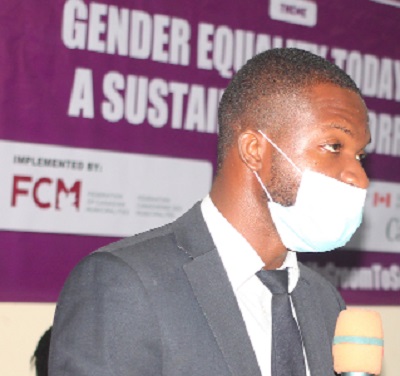The Assistant Programme Officer of the Ministry of Gender, Children and Social Protection, Mr Barry Quist, has said there is a need to recognise and advance gender equality in the context of climate change and disaster risk reduction.
He stated that the current climate change crisis coupled with COVID-19 pandemic had also brought the need to take appropriate actions that would better the lives of women, girls, the vulnerable and the excluded.
“Women are increasingly being recognised as more vulnerable to climate change impacts than men as they constitute the majority of the world's poor and are more dependent on the natural resources that threaten climate change the most”, Mr Quist explained.
He made the remarks in a keynote speech read on behalf of the ministry on the theme: “Gender Equality Today for a Sustainable Tomorrow,” at the commemoration of the 2022 International Women’s Day held in Accra. The event was organised by the National Association of Local Authorities of Ghana (NALAG), in collaboration with the Federation of Canadian Municipalities (FCM).
Women in climate change
Mr Quist said climate change could have adverse effects on women's and girls' safety and security, which increased the burden of their unpaid care work and also limited their access to natural resources, clean water, food, transport, energy, sanitation, housing, among others.
He further said women and girls had important roles as primary land, water, and natural resources managers and powerful agents of change in formulating responses to climate change and must be seen as part of the solution.
![]()
“Women are fundamental in climate change mitigation due to their critical role in energy efficiency, their receptiveness to greener sources of energy as well as their power to change consumption patterns,” Mr Quist added.
Way forward
Mr Quist, therefore, called for the design of climate change mitigation and adaptation programmes that would reduce women's and girls' unpaid care work while strengthening collaboration with all the actors.
This, he said, would ensure that gender was adequately incorporated in the management of climate change.
“Achieving gender equality calls for concerted efforts from all stakeholders. We must work together in sharing ideas towards a more equal and pleasant society. We should continue to develop policies and interventions to promote gender equality in the context of climate change”, Mr Quist explained.
Mr Quist also said in order to facilitate the integration of gender concerns into climate change, a gender analysis had been conducted for the seven priority sectors of the nationally determined contributions, which included Agriculture, Energy, Health and Disaster Risk Reduction, among others, to identify key gaps for gender mainstreaming.
Women participation
For his part, the General Secretary of NALAG, Mr Kokro Amankwah, urged Ministers of State, Members of Parliament, metropolitan, municipal and district chief executives to identify to groom and get women elected to deepen women representation at the local level.
Mr Amankwah also said despite women's significant contribution to economic and social development, they were disproportionately impacted by poverty, adding that their efforts were undermined due to cultural and systemic barriers.
In addressing those challenges, he said the NALAG was organising training and capacity-building workshops and popular participation engagement across the country.
“They are aimed at equipping assembly women to deliver on their mandate to justify the confidence reposed in them and also make a case for women unique capabilities when it comes to leadership” Mr Amankwah explained.

